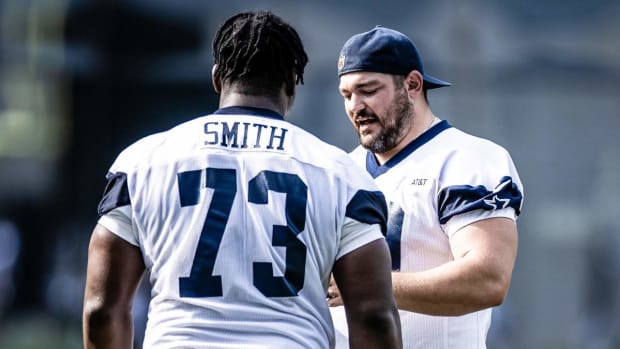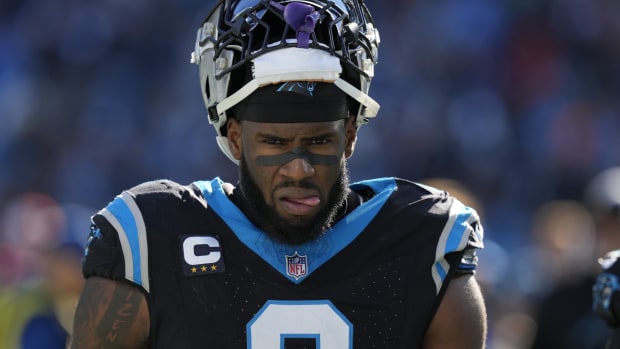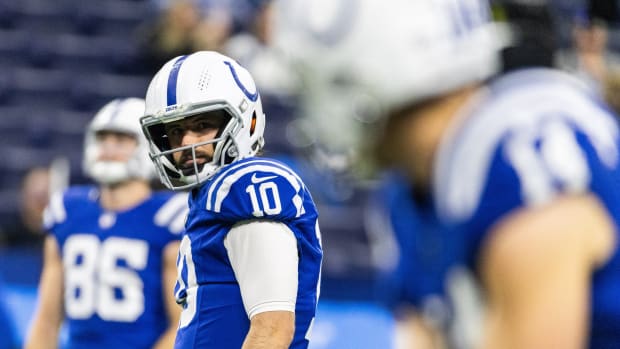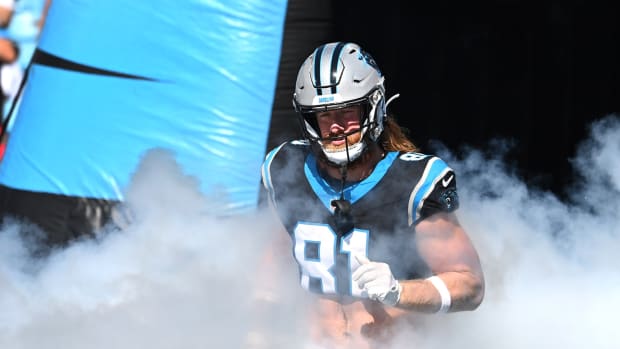The NFL and Social Justice: This Is What Players and Teams Are Doing in Their Communities
Khadijah Lee had written this speech months earlier. While the 24-year-old Tampa native served a 366-day sentence in a state prison, she’d joined something called the Gavel Club, a program that gave her an outlet through writing and speaking.
You have reached your limit of 4 premium articles
Register your email to get 1 more
This speech told her personal story. Lee’s mother had battled addiction, so when Lee was 5, she was sent to live with her grandmother. In that home, she says, she was sexually abused by a family member. She’s been on her own since she was 18, moving between living situations that were often unstable. In July 2017, police found drugs in an apartment leased to her. She entered a “best interest” guilty plea for five felony drug charges and one misdemeanor count, rather than fighting them, because it was the fastest route home to her young daughter, Skye.
Lee never pictured sharing her letter with an audience that included seven NFL players. But on a Tuesday in October, on the campus of Abe Brown Ministries in east Tampa, that’s what she found herself doing. Even more, she couldn’t believe they cared about what she had to say.
It was an off day for the Buccaneers, in between games against the Falcons and Browns. The players visited the faith-based non-profit, which helps ex-offenders re-enter society, as part of the team’s year-long social justice initiative. After Lee was released from prison in May, early, she’d enrolled in Abe Brown’s Ready4Work program, sleeping on a friend’s floor for several weeks while she attended the program’s career-development training course. Her job applications were coming up empty, but through the program she landed a position as a court clerk for the Public Defender’s office. In order to get to work on time, she was waking up before dawn to catch multiple buses, to first drop her daughter off at day care by 6:30 a.m. and then make it to the office by 8.
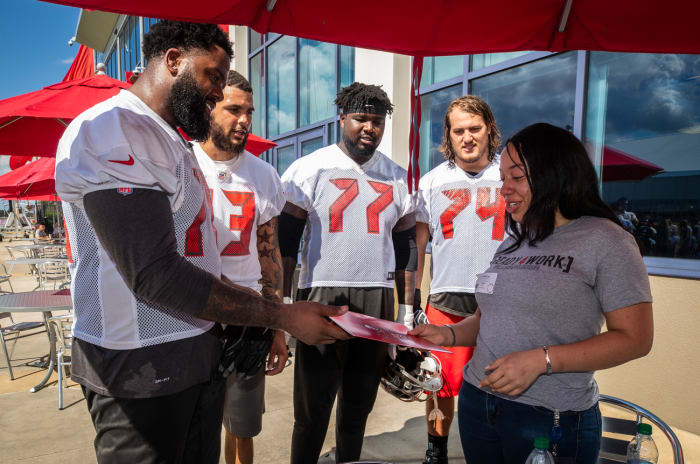
Donovan Smith, Mike Evans, Caleb Benenoch and Ali Marpet with Khadijah Lee.
Kyle Zedaker/Tampa Bay Buccaneers
“Hearing her hard work and dedication to turn her life around,” says Bucs left tackle Donovan Smith, “and her being able to stay on track and understanding things need to be done by any means—it just hit me.”
Smith wanted to do more. So on the drive back to the Buccaneers facility, he and his teammates came up with another way to help.
This is one example, in one NFL city, of how teams and players are working on issues of social justice in the cities where they play. NFL teams have long done work in their communities. But in the two years since Colin Kaepernick first took a knee during the playing of the national anthem in 2016, to protest police brutality and racial inequality, many of these efforts have taken on a more specific focus: issues that are important to people of color, who comprise about 70 percent of the league’s players.
A week before the NFL season started, Legal Action of Wisconsin received a phone call from a potential donor. He wanted to know who they serve, what they do for clients, and if it was hard to reach them because it can be embarrassing to ask for help. The caller’s name was Aaron Rodgers. He was considering the legal aid organization for one of the Packers’ five $50,000 social justice grants.
At Halas Hall, after a training-camp practice, research managers from the University of Chicago Crime Lab presented 27 power-point slides to a group of five Bears players and team chairman George McCaskey, to help inform where the team directed its resources. The data included maps of Chicago illustrating that pockets with the most violent crime overlay with high-poverty neighborhoods; high school graduation rates by race; and a bar graph representing how much higher gun homicides are for African-Americans in Chicago than for any other group. In Philadelphia, safety Malcolm Jenkins’ keeps a two-inch three-ring binder stashed in his locker, containing information on all the organizations the Eagles are considering for grants from the team.
This is the work going on behind-the-scenes around the NFL. The MMQB surveyed all 32 clubs, and every team has done something that falls under the umbrella of social justice—though the spectrum ranges from broad teamwide platforms to a handful of player-led events.
VRENTAS:The NFL and social justice—a look at what each team is doing
Late last season, the NFL and the Players Coalition, a social change and advocacy group of current and former players founded by Jenkins and Anquan Boldin, agreed to a seven-year social justice partnership, with the league and team owners promising millions of dollars to projects focusing on education and economic advancement, community-police relations and criminal justice reform. The NFL says it will put an additional spotlight on leaguewide social-justice efforts with a new “Inspire Change” initiative during January and February, which will include a TV spot, grassroots funding and new nationwide programming.
It’s an unprecedented platform for social and racial issues, one that calls for all 32 teams and all players, whether they have done work in this space or not, to research, engage and think about topics that can be uncomfortable. The platform has also been criticized by some players. Panthers safety Eric Reid, Kaepernick’s former teammate in San Francisco, told reporters earlier this season that he believes the deal was offered as a quid pro quo to get players to stop kneeling, while Kaepernick remains unemployed. Reid and several other players broke away from the Players Coalition during negotiations last fall, and when Carolina played in Philadelphia earlier this season, Reid confronted Jenkins during the coin toss, and after the game called him a “sellout” for agreeing to the deal.
Says Jenkins, “I've always maintained that, for one, I can't control anybody in this league, nor would I want to or ask anybody to. But what I was interested in was being able to figure out how to leverage the NFL's platform, how to create something that would outlast my career and outlast my reach, and where everybody could participate.”
Reid also said the NFL suggested cutting funding for campaigns like Salute to Service and a Crucial Catch to fund the social justice initiative, though the league says that was not discussed. “Social justice was looked at as another issue that the NFL could make its mark on and can have an impact,” says Anna Isaacson, the league’s senior VP of social responsibility, “not at the expense of anything else.”
The Buccaneers are one of about a dozen teams that have already launched broad social-justice platforms this year. Tampa Bay’s is called, “We Are The Change,” built around monthly events scheduled through June 2019. Players participated in the Tampa Police Department’s Citizens Academy in September; met with ex-offenders, like Lee, who are enrolled in Abe Brown’s Ready4Work training program in October; and this month took part in a mentoring event at a juvenile detention facility in Tampa. The team also created a $1 million fund, to match players’ contributions to local organizations working on social justice causes.
That team-based pot is one part of the funding set up through the NFL-Players Coalition partnership. At the league meetings in March, club owners approved a program in which each team would match up $250,000 annually in contributions from current and former players, though teams can exceed that amount. Teams and individual players can also apply for additional social-justice grants through the NFL Foundation. This spring the Falcons supplemented owner Arthur Blank’s contributions to the Boys & Girls Club, Habitat for Humanity and the Atlanta Police Foundation with three NFL grants; the Packers also applied for social-justice grants from the league to support a playground built on reclaimed property in Milwaukee with players and local police. The individual player grants are for up to $5,000, to be used in either their hometowns or the cities where they play.
The Bears were the first team this year to max out the player-team matching program. The five players on the Bears’ social justice committee—Sam Acho, Trey Burton, Akiem Hicks, Mitchell Trubisky and Chase Daniel—told the team during a training-camp meeting about the matching opportunities. More than 40 players donated, Burton said, and the deal places no cap on how much each player can contribute. If a single player wanted to donate $250,000, he could.
Combined with contributions from coaches and the front office, and additional matching through the Bears Care foundation plus some NFL grants, the team raised $813,850, which will be split among five Chicago organizations doing work such as providing shoes to the homeless and offering intervention or tutoring services to at-risk kids. The five players hold a majority on the nine-person committee, “so we have a final say on what’s going on, and where the money is going,” Burton says.
That personal investment is one reason Jenkins said they decided on a matching program for team-based funding. The total partnership was originally reported by ESPN to offer $89 million in funding, distributed both nationally and locally. The player-team matching program is one portion, which could generate $16 million annually if all 32 teams max it out like the Bears did. The matching program is locked in through 2022 regardless of participation levels; the final year of the deal is an option year, meaning that the program will extend through 2023 if player participation across the league averages 50 percent in 2021 and 2022.
“It being player-driven and players investing in it, I think is important,” Jenkins says. “Because I think that we have the heart for it, we have the drive to steer it, and we have the responsibility to make sure that it’s not a PR stunt, and that things are really getting done.”
It’s too early to say what the participation levels in the player-team matching programs will be this year, as many teams are still brainstorming or finalizing their plans. The 49ers just this week announced their joint $2.35 million grant with Google.org to the National Center for Youth Law. Last week the Eagles awarded their first round of grants, totaling $190,000, to four Philadelphia non-profits; one of the selected organizations, the Philadelphia Community Bail Fund, applied those resources to bail out nine individuals the night before Thanksgiving. The Patriots met during their recent bye week to discuss their strategy; the Bills are among the teams currently collecting contributions from players and coaches toward the $250,000 goal. There is no hard deadline, but the idea is for these efforts to refresh each league year, from March to March.
Different teams have taken different approaches on how to invest not just money but their time. The Chiefs distributed questionnaires during the offseason, asking players what causes they were most interested in supporting, and planned four events this season around the most popular responses. The Packers decided to donate $250,000 outright instead of matching player donations; they asked a small group of players to submit organizations they’d like to support and then voted to pick five. Rodgers chose Legal Action; tight end Lance Kendricks selected Sherman Phoenix, a redevelopment project in his hometown of Milwaukee to construct a community space for small businesses-of-color in the neighborhood where riots broke out after a fatal police shooting. “If a kid has a dream of owning a barbershop, and he goes to this local barbershop, and it’s minority-owned, the owner looks like the kid, I think that helps a ton,” Kendricks says.
In Cleveland, Browns owners Dee and Jimmy Haslam organized a series of summits in which players heard from local law enforcement and government officials about ways they could impact the area. During one of these sessions, Seth DeValve and Christian Kirksey took note of a statistic cited by a former director of the Ohio Department of Rehabilitation and Correction, who said recidivism has been close to 50 percent in Ohio. That inspired them to begin a relationship with Towards Employment, an organization that provides re-entry training for ex-offenders, to provide them with job and life skills to help them stay out of prison.
The Dolphins’ platform, Football Unites, is built around the same idea as team owner Stephen Ross’ Ross Initiative in Sports for Equality, using sports as a catalyst for social change and improving race relations. The Dolphins’ programs include a partnership with 5000 Role Models, a mentoring program for at-risk boys in the Miami-Dade school district; this year, the first Project Change four-year college scholarship was awarded to Valicia Browne, a Florida State-bound student from Boca Raton who has a goal of creating clinics to provide affordable health care in underserved communities. The Dolphins also awarded 11 grants from a social justice fund created last year to local organizations including the Trayvon Martin Foundation; the Community Justice Project, Inc., a non-profit law firm; and two groups supporting the LGBTQ community.
These plans began last season, when Kenny Stills and former teammates Julius Thomas and Michael Thomas discussed with Ross ways to address the issues for which they were peacefully demonstrating during the national anthem. “Honestly, I think at first it was, just like the league, trying to figure out, what do we have to do to get you guys to stop demonstrating?” Stills says. “I think over time, the people in power here with the Dolphins have noticed how consistent and how serious we are, and I am, about what we’re doing. It’s honestly been great to see how things have changed.”
Stills adds, “It hasn’t always been rainbows and butterflies here. It was a difficult growing process, for us, for me and for the team. But we’re in a good place right now, and I’m very supported here.”
Stills also split from the Players Coalition last fall for many of the same reasons Reid outlined. While he’s open to the Dolphins supplementing their efforts with funds through the team/matching program, Stills said he’s tried to keep his social-justice work separate from the NFL-Players Coalition platform. “If one of our brothers is not being allowed to play because he decided to demonstrate first,” Stills says, referring to Kaepernick, “the only solution to that is to bring him back, and then we can talk about how do we move forward in the social justice realm.”
A handful of players, including Reid and Stills, have continued to take a knee during the anthem before games this season. Several others have chosen to stop demonstrating, including Jenkins, who had previously raised a fist. It’s a reminder that social justice is not a one-size-fits-all issue; that individual people are motivated by different goals and experiences.
“When people choose to demonstrate or to speak out against social injustice, everybody is doing it for a slightly nuanced reason,” says DeValve, who was part of a Browns group that knelt together in prayer during the anthem after the white supremacist rally in Charlottesville in 2017. “Some people are doing it until something happens, and what that thing is may be a little different to each person. … Some of those goals are more lengthy than others. And that will cause people to disagree over various outcomes in taking a step towards that goal.”
It clearly hasn’t been a straight line from when Kaepernick first took a knee two years ago to where we are today. The NFL-Players Coalition partnership came out of the ugly chapter last fall, when President Donald Trump called on NFL owners to fire the “sons of bitches” who kneel during the anthem, and from some NFL players feeling misunderstood or unsupported by the league and team owners in their efforts to raise awareness for issues that mattered to them.
“We needed the, I would say, divisive conversations,” says Troy Vincent, the NFL’s EVP of football operations. “It was toxic; it was ugly; thinking about walking into rooms and trying to keep people from flipping tables, to now there is a true understanding that these issues affect us all; that even though I may not go home to them every day, it still affects … the community in which I serve.”
NFL AND SOCIAL JUSTICE:Team-by-team efforts
But the divide widened again in May, when team owners voted for a change in the national anthem policy to require players to either stand or stay in the locker room, or face discipline. On the eve of training camp, the NFL and the players union agreed to put the policy on hold, wisely playing the season with effectively no anthem policy. “We got back on track when there was a stay,” Vincent says. “Once that was parked … it really allowed for the issues to be front and center.”
If you ask the organizations that NFL teams and players have been working with, they’ll explain what it means that 32 teams are confronting these issues in their communities—issues that have been largely overlooked in our country, because they’re too complicated or difficult to talk about, or because they mainly affect groups of people who are marginalized or in the minority.
“These players have a platform and can lead change, in a way an average Joe Blow like myself cannot,” says Robert Blount, president of Abe Brown Ministries. “We are doing this work, and have been for 40 years, but they have more influence and resources to bring to bear that can help us turn the corner.”
Consider: Rodgers is currently the centerpiece of Legal Action of Wisconsin’s homepage, his picture in between four diverse faces, with the headline: “Aaron Rodgers & the Green Bay Packers are proud to support Legal Action of WI. This is about equal justice & something bigger than ourselves.” The Packers’ grant will be able to fund the work of a full-time lawyer for about half of one year, helping hundreds of clients.
“The money is great,” says Deedee Peterson, the organization’s associate executive director, “but the attention called to legal aid as part of the solution, we think is worth more than $50,000.”
And JoAnne Sabir, one of the developers of Sherman Phoenix, the Milwaukee redevelopment program, says this kind of kind of community project can only happen through grants like the one the Packers made, because it’s too expensive to use traditional financing to redevelop abandoned properties. “It’s a tipping point,” she says, “taking players’ own interests and looking into innovative projects that aren’t funding the same points of opportunity. Because oftentimes, even in the philanthropic world, people begin to fund the same things.”
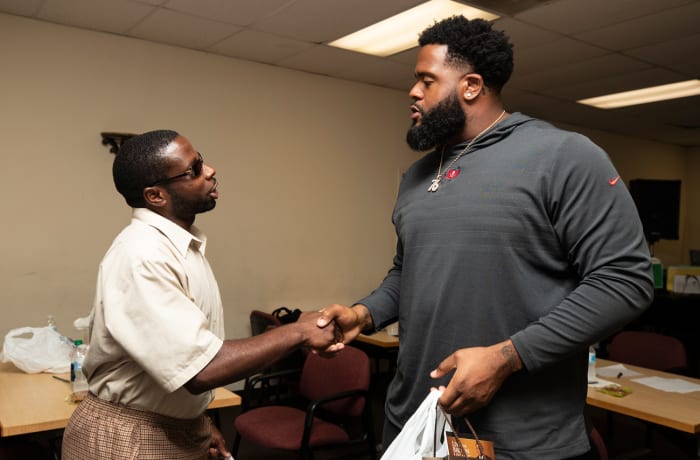
The Bucs’ Donovan Smith at the Abe Brown Ministries Ready 4 Work program.
Kyle Zedaker/Tampa Bay Buccaneers
Back in Tampa, Donovan Smith’s idea after hearing Khadijah Lee’s speech was to help her stay on her new path through better access to transportation. Left guard Ali Marpet, who’d also visited Abe Brown, was in. The next day they were talking about their idea with the team’s player development director during a break in practice, when Mike Evans overheard. He’d chip in. They’d originally planned on just buying her an Uber gift card, but by the time they pooled funds and matched them through the Bucs’ social justice fund, they realized they had $20,000, enough money to buy her a car. They invited Lee to the team facility, where they presented her with a $500 credit to Uber—and then told her about their bigger plan. She had no idea sharing her story that Tuesday in October could have had such an impact.
“I feel like gaps are being filled,” Lee says. “I never thought that I’d be sitting in the same room with the Bucs, or that they’d care about what’s going on in my life, in any way. It wasn’t an NFL player talking to a felon. It’s regular people talking to regular people.”
Question or comment? Email us at talkback@themmqb.com

































